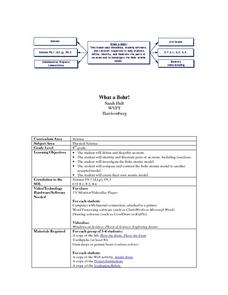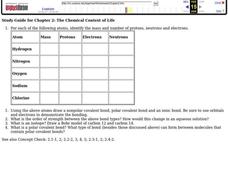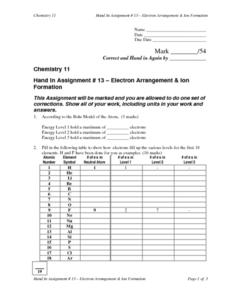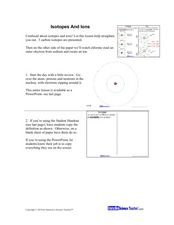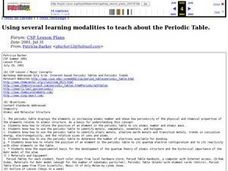Curated OER
Atomic Emission Spectra and the Bohr Model of the Atom
High schoolers investigate the wavelengths of spectra lines for common atoms. In this atomic emission spectra lesson plan, students use a transformer and diffraction grating to observe the emission spectra of various atoms. They find the...
Cornell University
What Happens When We Excite Atoms and Molecules?
Excited atoms lead to exciting lessons! Learners use heat and light to excite both atoms and molecules. They display their learning in the form of Bohr models depicting the excited state of the atoms.
Virginia Department of Education
Historical Models of Atoms
What does the past have to do with today? Young scientists find that answer as they learn more about past chemists and their significant contributions to the field. Pupils use the Internet to research historical figures...
Curated OER
Atomic Structure and Bonding
Eighth graders discuss and write about what led up to the discovery of the atom. Students label proton, nucleus, electron, and neutron in their notes. Students take notes on electron shells and how different atoms have different...
Curated OER
What a Bohr!
Students define, identify and illustrate the parts of an atom, and investigate the Bohr atomic model. Students watch a multimedia presentation to understand an atom's parts and their functions. In groups, they create a model of an atom...
Curated OER
Modern Physics, Old QT
In this physics worksheet, students develop an understanding of the atomic model and how atoms relate to one another through answering the seven questions.
Curated OER
Mystery : Structure of the Atom-A Case for Indirect Evidence
Students investigate the structure of the atom through hands on activities. In this atomic structure lesson, students perform 4 activities showing indirect evidence of the structure of the atom and the parts of the atom. They also list...
Curated OER
Atomic Structure
In this atom worksheet, students define the atomic theory, compare an atom and a molecule, determine atomic number and number of protons for elements, and draw Bohr models for given elements. This worksheet has 4 graphic organizer, 8...
Curated OER
The Flame and the Atom:
Students investigate the structure of atoms. Students read information about the Rutherford model, the Bohr model, and the Quantum Mechanical model examining each for its scientific validity. They watch a PowerPoint presentation of alpha...
Curated OER
Atomic Structure
Young scholars are introduced to moles and Avogadro's number, Bohr's model, Atomic emission spectra and quantum numbers. They also comprehend the current model of atoms and how electrons are described by quantum numbers.
Curated OER
The Chemical Context of Life
In this chemistry worksheet, students fill in the chart for question one. The chart is filled out examining the mass, protons, electrons, and neutrons for specific atoms.
Curated OER
The Day the Atom Died (Grade K-1)
Students investigate what is wrong with the Rutherford atomic model. In this chemistry lesson, students answer questions about the atomic model after watching a video. They draw conclusions from the video and discuss how the atomic model...
Curated OER
How do protons stick together in a nucleus?
Students explain that the Standard Model of the atom includes particles beyond protons, neutrons, and electrons. They describe the nucleus as conglomeration of quarks that manifest themselves as protons and neutrons.
Curated OER
Honors Chemistry I
In this honor chemistry I worksheet, students use all available resources to answer each question given. Students apply their knowledge of light, quantum theory of light, Bohr's model, photoelectric theory.
Curated OER
Electron Arrangement and Ion Formation
In this elements worksheet, students determine how electrons fill up the energy levels for the first 18 elements of the periodic table. Students determine if elements gain or lose electrons to form a stable ion. This worksheet has 4...
Curated OER
Atomic Structure and Quantum Theory
Students are introduced to the structure of an atom and Dalton's atomic theory through a short video and mini-lecture. They also take a look at the weight of mass and become familiar with the idea of quantum theory
Curated OER
Matter
Fifth graders investigate the structure of matter. They examine pictures of atoms and molecules and discuss their relationships, and construct a model of a molecule using toothpicks and gumdrops.
Curated OER
Isotopes and Ions
Students examine the concepts of isotopes and atoms. In this powerpoint lesson, students see the balance in numbers of protons, neutrons, and electrons create isotopes and ions of certain atoms.
Curated OER
Worksheet 4-1 Atomic Spectra
In this atomic spectra worksheet, students answer eighteen questions about wavelengths of light, the emission spectrum, energy of photons, the frequency of electromagnetic radiation and electrons in the excited state.
Curated OER
If My Configurations are Correct
Students write the electron configuration of elements in the ground state. In this chemistry lesson, students draw how subatomic particles are arranged in the atom. They construct Lewis dot diagrams of valence electrons.
Curated OER
Physicists or Philosophers?
Trace the sequential process of the developing theories of atomic structure in the early 20th century, show, in historical development, how scientists "know" things, how experiments are set up and how interpretations are drawn from them,...
NASA
Supernova Chemistry
By measuring the wavelength, frequency, and intensity of electromagnetic radiation, scientists determine the temperature, density, and composition of far away items. Scholars rotate through ten lab stations using a spectroscope at each...
Curated OER
Physical and Chemical Changes
Eighth graders view a PowerPoint presentation that assist them in distinguishing between physical and chemical changes. They compare their observations of demonstrations to a list of clues recognizing types of changes.
Curated OER
Using several learning modalities to teach about the Periodic Table.
Students identify how to relate the position of an element in the periodic table to its atomic number and atomic mass. They identify how to use the periodic table to identify metals, semimetals, nonmetals, and halogens, and also,...




